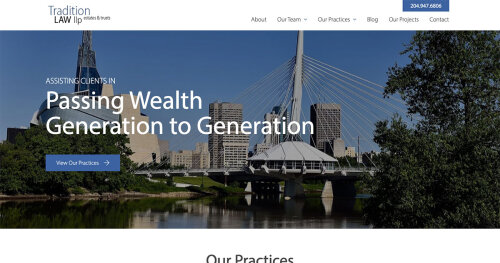Best Aviation Lawyers in Winnipeg
Share your needs with us, get contacted by law firms.
Free. Takes 2 min.
List of the best lawyers in Winnipeg, Canada
About Aviation Law in Winnipeg, Canada
Aviation in Winnipeg, Canada, plays a significant role due to the presence of major airports like the Winnipeg James Armstrong Richardson International Airport, and its strategic importance as a transportation hub in the region. The city's aviation sector encompasses a wide range of activities, from commercial flights to air cargo and private aviation. Aviation law in Winnipeg is shaped by federal regulations, primarily under the jurisdiction of Transport Canada, which oversees the safe and efficient operation of aerospace activities across the country. Locally, the City of Winnipeg, in partnership with other stakeholders, ensures that aviation activities are harmoniously integrated with community and economic development plans.
Why You May Need a Lawyer
There are several situations where individuals and organizations may require legal assistance in the field of aviation in Winnipeg. Common scenarios include:
- Accidents and Incidents: Navigating the legal complexities arising from aviation accidents, including liability and compensation issues.
- Regulatory Compliance: Ensuring compliance with aviation regulations, which is crucial for operating aircraft legally and safely.
- Employment and Labor Issues: Handling disputes involving aviation industry employees, such as pilots, cabin crew, and ground staff.
- Commercial Transactions: Legal support in the acquisition, leasing, and financing of aircraft.
- Environmental Concerns: Addressing legal matters relating to noise pollution, air quality, and other environmental impacts of aviation.
- Cross-Border Aviation Issues: Managing legal challenges related to international air travel and transportation agreements.
Local Laws Overview
In Winnipeg, several key aspects of local laws are particularly pertinent to aviation:
- Air Navigation and Transport: Governed by federal regulations set by Transport Canada, including rules for aircraft operation, maintenance, and air traffic control.
- Airport Zoning Regulations: Local zoning laws that ensure safe navigation and operation around airports, including height restrictions and land use compatibility.
- Environmental Regulations: Compliance with both federal and provincial environmental standards to mitigate the ecological impact of aviation activities.
- Consumer Protection Laws: Protect passengers' rights within Canada, providing recourse for issues like flight delays and cancellations.
- Employment Standards: Provincial labor laws governing employment terms for those working within the aviation sector.
Frequently Asked Questions
What constitutes aviation law in Canada?
Aviation law in Canada encompasses regulations and legal principles governing flight, air travel, business operations, and all related legal issues involving aircraft and airport operations.
Who regulates aviation in Winnipeg?
Aviation in Winnipeg is primarily regulated by Transport Canada at the federal level, with local input from the City of Winnipeg for zoning and environmental aspects.
Can I handle aviation accident claims without a lawyer?
While it's possible to handle minor claims independently, aviation accident claims can be complex and often require specialized legal expertise to navigate liability, insurance, and compensation issues.
What are passenger rights when flying out of Winnipeg?
Passenger rights include compensation for overbooking, flight delays or cancellations, and lost luggage, as regulated by the Air Passenger Protection Regulations in Canada.
Are there specific zoning laws near airports?
Yes, there are specific zoning laws to ensure safety and minimize hazards in airport vicinity, such as restrictions on building heights in designated areas around airports.
How are environmental concerns addressed in aviation law?
Environmental concerns are addressed through regulations limiting emissions, managing noise pollution, and ensuring sustainable airport development practices.
What should I do if I have a dispute with an airline?
If you have a dispute, first contact the airline's customer service. If unresolved, consider escalating the issue to the Canadian Transportation Agency or seeking legal advice.
Do aviation laws differ between provinces?
While federal laws are consistent across Canada, some provincial regulations may affect aviation in terms of labor laws and environmental policies.
Is drone operation included in aviation law?
Yes, drones are regulated under aviation laws, with specific rules for their operation to ensure safety and compliance with privacy standards.
How can aviation law affect commercial airlines?
Laws affect operational standards, safety procedures, employee rights, passenger rights, and compliance with national and international regulations.
Additional Resources
For those seeking further information or assistance, consider consulting the following resources:
- Transport Canada: The central federal body for aviation regulation and safety standards.
- Canadian Transportation Agency: Addresses consumer complaints and enforces passenger rights.
- Winnipeg Airports Authority: Provides insights into local airport operations and development.
- Law Society of Manitoba: Offers resources for finding qualified legal professionals specializing in aviation law.
- Canadian Bar Association: Provides general legal guidance and additional resources related to aviation law.
Next Steps
If you require legal assistance in aviation, consider the following steps:
- Identify your specific legal needs or concerns related to aviation matters.
- Contact a lawyer specializing in aviation law to discuss your case and obtain professional advice.
- Gather all pertinent documents and information that may be relevant to your legal inquiries.
- Inquire about potential initial consultations to understand the lawyer's approach and fee structure.
- Stay informed about ongoing changes in aviation regulations that may affect your case.
Lawzana helps you find the best lawyers and law firms in Winnipeg through a curated and pre-screened list of qualified legal professionals. Our platform offers rankings and detailed profiles of attorneys and law firms, allowing you to compare based on practice areas, including Aviation, experience, and client feedback.
Each profile includes a description of the firm's areas of practice, client reviews, team members and partners, year of establishment, spoken languages, office locations, contact information, social media presence, and any published articles or resources. Most firms on our platform speak English and are experienced in both local and international legal matters.
Get a quote from top-rated law firms in Winnipeg, Canada — quickly, securely, and without unnecessary hassle.
Disclaimer:
The information provided on this page is for general informational purposes only and does not constitute legal advice. While we strive to ensure the accuracy and relevance of the content, legal information may change over time, and interpretations of the law can vary. You should always consult with a qualified legal professional for advice specific to your situation.
We disclaim all liability for actions taken or not taken based on the content of this page. If you believe any information is incorrect or outdated, please contact us, and we will review and update it where appropriate.












